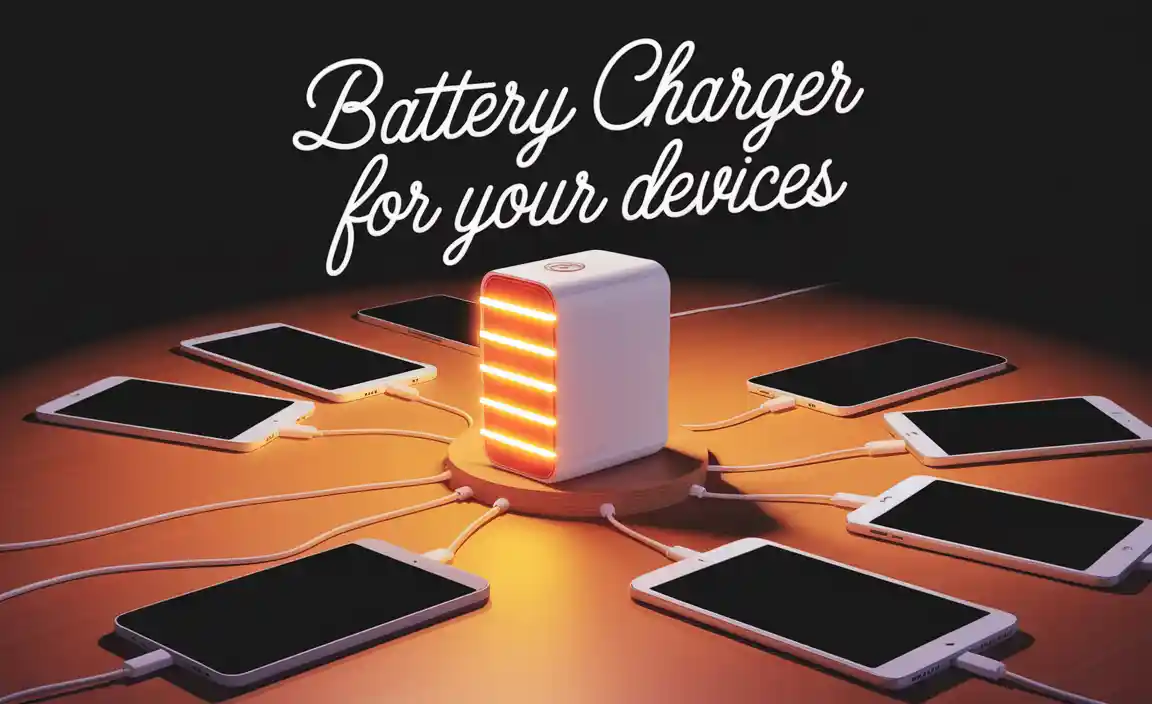Have you ever wondered how to store batteries for long-term use? With so many devices needing power, knowing the right way to store batteries can help you save money and keep your gadgets working. Imagine reaching for a battery and discovering it’s dead. That disappointment can be easily avoided.
Many people overlook their batteries when it comes to storage. Did you know that batteries can last much longer if stored properly? It’s true! Storing them in the right place can make a big difference. Let’s explore the best ways to store batteries for long-term use.
By following a few simple steps, you can protect your batteries from damage. Plus, you’ll feel good knowing you are making a smart choice. Who doesn’t want to avoid that last-minute store run when the remote runs out of battery?
How To Store Batteries For Long Term Use Safely And Effectively

How to Store Batteries for Long Term
Storing batteries properly is crucial for their longevity. Always keep them in a cool, dry place. Extreme heat or cold can damage them. Did you know that fully charged batteries last longer during storage? Before putting them away, make sure to remove them from devices to avoid leaks. Consider storing them in their original packaging or in non-conductive containers. By following these simple steps, your batteries can stay fresh and ready for use when you need them!Optimal Storage Conditions
Ideal temperature range for battery storage. Importance of humidity control in storage areas.Storing batteries correctly is like giving them a cozy blanket and a warm cup of cocoa! The ideal temperature for battery storage ranges from 50°F to 80°F. Too hot or too cold can make them grumpy and less effective. Also, keep an eye on humidity. Batteries prefer dry homes, so aim for less than 50% humidity. Otherwise, they might start to rust, and who wants soggy batteries?
| Storage Condition | Ideal Range |
|---|---|
| Temperature | 50°F – 80°F |
| Humidity | Below 50% |
Preparing Batteries for Storage
Cleaning battery terminals before storage. Discharging batteries to the recommended levels.Clean battery terminals to make sure your batteries work well. Use a damp cloth to wipe away dirt and grime. This helps prevent any problems later. Also, batteries should have the right charge before storage. Discharge them to their recommended levels. This keeps them safe and makes them last longer. Remember, following these steps can save you from battery trouble later!
Why Clean and Discharge Batteries?
Cleaning and discharging batteries helps maintain their life. Dirty terminals can cause poor connection. Fully charged batteries can get damaged over time when stored. So, cleaning and discharging makes sure you are ready to use them when needed!
Storage Containers and Locations
Recommended containers for battery storage. Best locations for storing batteries safely.Choosing the right containers and locations is important for battery safety. Use plastic bins or original packaging to store batteries. Keep them in a cool, dry place away from sunlight. Avoid damp areas like basements.
- Use sturdy plastic or metal containers.
- Avoid cardboard boxes to prevent moisture damage.
- Store batteries upright to avoid leaks.
Find a spot that is out of reach of children and pets. A closet or shelf is usually best. Remember, safe storage can help your batteries last longer!
What is the best way to store batteries?
Store batteries in cool, dry places and use proper containers to keep them safe.
Monitoring and Maintenance
Importance of checking battery health periodically. Signs of battery deterioration to watch for.Keeping an eye on your batteries is very important. Regular checks can help you spot problems early. Look for these signs of battery wear:
- Swelling or bulging
- Leakage or corrosion on the terminals
- Low voltage or slow performance
If you find any of these signs, it’s time for a new battery. Healthy batteries last longer and work better. Remember, a little care can go a long way!
How often should I check my batteries?
You should check your batteries at least once every three months. Regular checks keep them in good shape.
Recycling and Disposal Options
Proper disposal methods for expired or damaged batteries. Recycling programs for different battery types.To keep our planet safe, we must dispose of batteries properly. Expired or damaged batteries can be harmful. Here are some safe disposal methods:
- Take them to special recycling centers.
- Look for battery drop-off locations in your area.
- Follow local guidelines for battery disposal.
Different types of batteries have different recycling programs, like:
- Lead-acid batteries: Found in cars, go to recycling centers.
- Rechargeable batteries: Check stores for drop-off spots.
- Household batteries: Often recycled at hazardous waste events.
Using recycling programs helps keep our environment clean and safe.
How to recycle batteries?
To recycle batteries, you can find a local drop-off center or event. Be sure to follow local guidelines for your battery type!
Common Myths About Battery Storage
Debunking myths related to battery lifespan and storage. Clarifying misconceptions regarding temperature effects.Many people believe that batteries are only good for a short time. This isn’t true! With proper care, they can last much longer. Here are some common myths that need debunking:
- Cold temperatures damage batteries. Actually, cooling can help extend battery life.
- Storing batteries while they’re fully charged is best. This can lead to faster wear. It’s better to store them at around 40% charge.
- Damp environments are fine for storage. Moisture can cause batteries to rust. Keep them dry!
Understanding these myths can help you take better care of your batteries.
How does temperature affect battery life?
Extreme heat can shorten battery life, while cool temperatures help it last longer. Aim for a cool, dry place when storing batteries.
Conclusion
In summary, to store batteries long-term, keep them cool and dry. Avoid extreme temperatures and humidity. Make sure to store them in their original packaging or a safe container. Check the battery status regularly. Following these tips will help your batteries last longer. For more details, you can explore articles on battery storage to learn even more!FAQs
What Is The Ideal Temperature Range For Storing Batteries Long-Term To Ensure Their Longevity?The best temperature range for storing batteries is between 50°F and 77°F (10°C and 25°C). This keeps them safe and helps them last longer. If it’s too hot or too cold, the batteries can stop working well. So, find a cool, dry place to store your batteries!
Should Batteries Be Stored In Their Original Packaging Or A Different Container, And Why?You should store batteries in their original packaging if you can. The packaging keeps them safe and helps prevent energy loss. It also stops the batteries from touching each other, which can cause problems. If you don’t have the packaging, use a safe container that keeps them separated. Always remember to store batteries in a cool, dry place!
Is It Necessary To Charge Batteries Before Long-Term Storage, And If So, To What Level?Yes, we should charge batteries before storing them for a long time. It’s best to charge them to about 50% full. This helps keep the batteries healthy. If they’re too full or too empty, they might get damaged. So, remember to check them every few months!
How Can One Safely Dispose Of Batteries That Are No Longer Functional Or Are Damaged?You should never throw batteries in the trash because they can be dangerous. Instead, find a collection center or recycling program near you. Many stores and local waste centers take old batteries for safe disposal. You can also check with your school or community for safe drop-off events. Always handle batteries carefully to avoid spills or leaks.
Are There Specific Types Of Batteries (E.G., Lithium-Ion, Nimh) That Require Different Storage Techniques?Yes, different batteries need different storage methods. For example, lithium-ion batteries should be stored in a cool, dry place. NiMH batteries (Nickel-Metal Hydride) can be stored at room temperature. Always keep batteries away from extreme heat or cold. This helps them last longer and work better!
{“@context”:”https://schema.org”,”@type”: “FAQPage”,”mainEntity”:[{“@type”: “Question”,”name”: “What Is The Ideal Temperature Range For Storing Batteries Long-Term To Ensure Their Longevity? “,”acceptedAnswer”: {“@type”: “Answer”,”text”: “The best temperature range for storing batteries is between 50°F and 77°F (10°C and 25°C). This keeps them safe and helps them last longer. If it’s too hot or too cold, the batteries can stop working well. So, find a cool, dry place to store your batteries!”}},{“@type”: “Question”,”name”: “Should Batteries Be Stored In Their Original Packaging Or A Different Container, And Why? “,”acceptedAnswer”: {“@type”: “Answer”,”text”: “You should store batteries in their original packaging if you can. The packaging keeps them safe and helps prevent energy loss. It also stops the batteries from touching each other, which can cause problems. If you don’t have the packaging, use a safe container that keeps them separated. Always remember to store batteries in a cool, dry place!”}},{“@type”: “Question”,”name”: “Is It Necessary To Charge Batteries Before Long-Term Storage, And If So, To What Level? “,”acceptedAnswer”: {“@type”: “Answer”,”text”: “Yes, we should charge batteries before storing them for a long time. It’s best to charge them to about 50% full. This helps keep the batteries healthy. If they’re too full or too empty, they might get damaged. So, remember to check them every few months!”}},{“@type”: “Question”,”name”: “How Can One Safely Dispose Of Batteries That Are No Longer Functional Or Are Damaged? “,”acceptedAnswer”: {“@type”: “Answer”,”text”: “You should never throw batteries in the trash because they can be dangerous. Instead, find a collection center or recycling program near you. Many stores and local waste centers take old batteries for safe disposal. You can also check with your school or community for safe drop-off events. Always handle batteries carefully to avoid spills or leaks.”}},{“@type”: “Question”,”name”: “Are There Specific Types Of Batteries (E.G., Lithium-Ion, Nimh) That Require Different Storage Techniques? “,”acceptedAnswer”: {“@type”: “Answer”,”text”: “Yes, different batteries need different storage methods. For example, lithium-ion batteries should be stored in a cool, dry place. NiMH batteries (Nickel-Metal Hydride) can be stored at room temperature. Always keep batteries away from extreme heat or cold. This helps them last longer and work better!”}}]}




